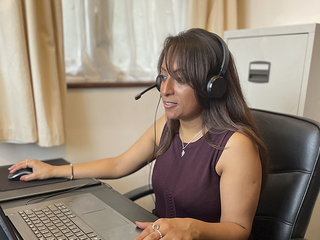New treatments to be made available to those at highest risk from Covid
On Wednesday the 8th December, the Government announced that people who are most at risk of severe Covid infection will now be able to access treatments quickly after they receive a positive PCR test.
What does this mean for people with blood cancer?
We’ve been told that those at highest risk of Covid will now receive the monoclonal antibody treatment Ronapreve within days of receiving a positive PCR test. At the moment, we’re seeking clarification about who will be eligible for this treatment and whether it will include all people with blood cancer. We will update you as soon as we know more.
What’s really important is that if you suspect you might have Covid, you should get tested as soon as you have any symptoms, as a positive PCR is the key to getting access to Ronapreve.
Currently, Ronapreve is only given to people who are sick with Covid in hospital following an antibody test. The announcement gives those at highest risk of developing severe Covid access to Ronapreve as soon as they’ve formally tested positive for the virus. We don’t think you’ll require an antibody test before getting the treatment in this scenario, but we’re seeking clarification on this. Once you test positive for the virus, you will be advised to go to hospital to receive Ronapreve. If this feels difficult for you, we'd recommend getting the advice and support of your healthcare team. If you’re unable to get to a hospital, you may be offered a different treatment which we explain below. We're still awaiting details of the logistics of how this will work, and how much your healthcare team will be involved in any decision making.
Ronapreve is a type of monoclonal antibody. Monoclonal antibodies give your body the Covid antibodies it needs to fight the illness. These antibodies will stick to the surface of the Covid virus and stop Covid from getting inside our cells and making us ill. Antivirals work slightly differently and interfere with the way the Covid virus replicates and reproduces. You can read about the difference between monoclonal antibodies and other types of treatment for Covid known as antivirals in this blog.
The reason people are being given a monoclonal antibody treatment instead of an antiviral is because currently this is where there is most evidence of benefit. For example, in a clinical trial of people who had Covid and had at least one risk factor for severe infection, Ronapreve reduced the risk of hospitalisation or death by 70%. If someone can’t receive this treatment, for example if they were unable to go to hospital, they would be offered an antiviral called molnupiravir instead.
You should shortly be receiving a letter from the NHS explaining your eligibility of this treatment and the steps you’ll need to take to access it in more detail. We expect these letters to be sent out from the 16th December. We’ll let you know a date when you should have received this letter when we find out and more about the logistics of how the roll out will work when we know more.
But I thought monoclonal antibody treatments weren’t as effective against the new Covid variant Omicron?
At the moment, the Delta variant is still dominant in the UK, although we suspect this will change. It's possible that monoclonal antibody treatments won’t work as well against the emerging Covid variant Omicron. This is because monoclonal antibodies work by sticking to a protein on the Covid virus called the spike protein. The antibodies have been specially engineered to be able to stick to this protein and trigger other cells to come and help to destroy the virus. The concern is that because Omicron has mutations in the spike protein, the monoclonal antibodies may no longer be able to stick and trigger the process of destroying the virus. However, we don’t yet know this for certain and more research is needed to fully understand this. The guidance recognises that if evidence were to emerge that suggested that Ronapreve was no longer an effective treatment against Omicron, then alternative treatments such as antivirals would be made available.
What else is available?
Also being announced is the rollout of the antiviral molnupiravir for those over 50, or with an underlying health condition that puts them at an increased risk of Covid, which are community will be able to access. It will be rolled out through a “trial-like” study called PANORAMIC that will take place at the University of Oxford. The trial is aiming to recruit 10,600 people who have a positive Covid PCR test. These people will then either be given standard treatments for Covid, or these same standard treatments plus the antiviral molnupiravir. This means there is only a 50% chance you will be given the treatment. Once people have tested positive for Covid, they will be able to sign up to this study online and will be sent their treatment depending on which group they’re randomised too. Molnupiravir is a course of tablets that can taken at home and should be taken within 5 days of symptoms starting.
We understand that all people with blood cancer can sign up for this study if they get a positive Covid test, regardless of whether they receive Ronapreve or not.
We welcome this news of additional treatments being offered to those at highest risk of Covid. There’s a lot we’re still unsure of but we remain in close contact with teams involved in the rollout of these treatments and will update you as and when we know more.

Worried about anything or have questions?
If you need someone to talk to, please don't hesitate to contact our Support Service by phone or email.
